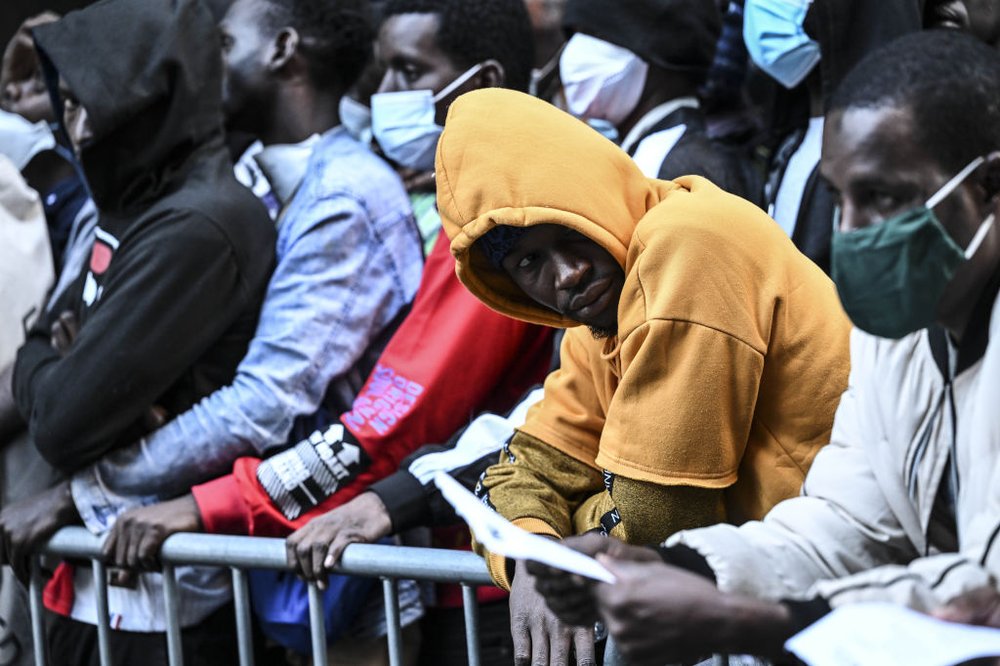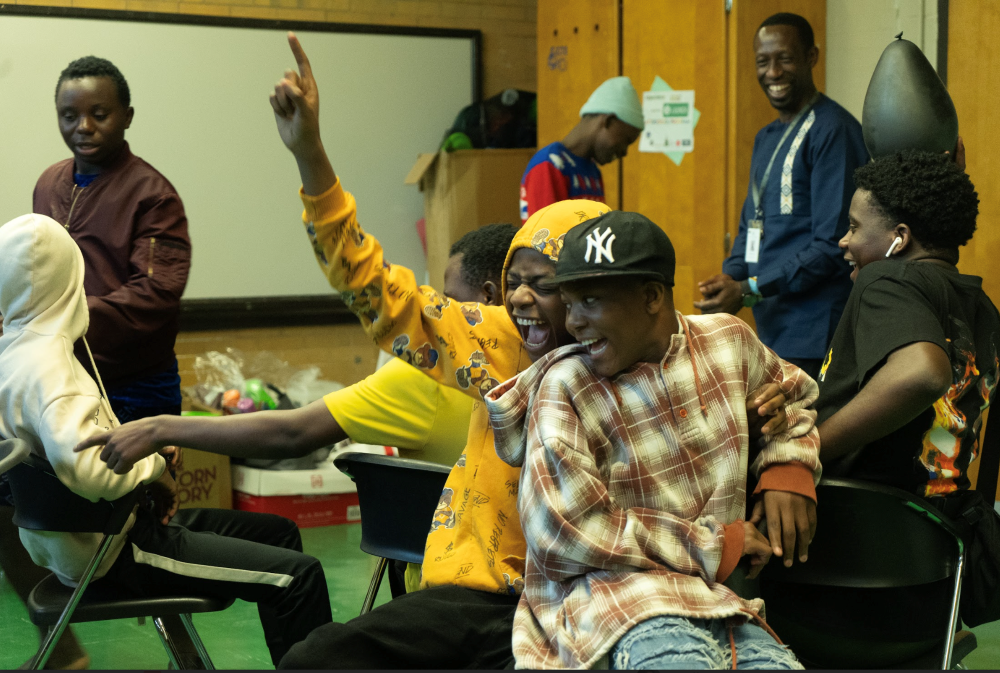NYC set to launch new migrant program … in Buffalo. Will more follow?
May 28, 2024, 7:01 a.m.
A novel resettlement program will enlist a nonprofit to help migrants leave city-funded hotel shelters in Buffalo, and immigrant advocates hope it can be replicated.

New York City officials are planning to launch a novel resettlement program to help migrants leave city-funded hotel shelters in Buffalo, which some proponents hope will serve as a blueprint for how the city manages the migrant influx moving forward.
The $22 million program would enlist a local nonprofit to relocate up to 539 migrants currently living in Buffalo hotels and help them find apartments, jobs and apply for asylum, according to City Hall spokesperson William Fowler. It's akin to the decades-old national resettlement system for refugees that advocates have asked the federal government to create for new migrants, who are mostly asylum-seekers.
The migrants in Buffalo are among the roughly 2,000 who have been living in ad hoc shelters upstate funded by New York City. The Adams administration began housing migrants in out-of-town hotels in May 2023, citing a lack of space in local shelters.
The Buffalo program marks a new approach in New York City's handling of the migrant influx, which has become a fiscal and political quandary for city officials with no clear end in sight. Local immigration advocates have hailed the program as a cheaper, more humane and sustainable approach to managing the crisis — and one that other state and local governments have also begun to pursue.
The tentative deal is being negotiated as Mayor Eric Adams' administration tightens local shelter rules for migrants in New York City, in an attempt to nudge the newcomers toward finding their own housing.
According to Fowler and New York City Comptroller Brad Lander, the new nonprofit-run program would eventually replace the hotel shelters in Buffalo run by DocGo, a medical service provider. The company has been mired in several high-profile scandals over alleged waste, fraud and abuse in its $432 million city contract to manage migrant shelters across the state.
This is a replicable program. We had hoped that this would have been adopted earlier … but we're still optimistic that this could be a model.
Sen. Sean Ryan, D-Buffalo area
“We look forward to working closely with state and local service providers to facilitate the next step in their journeys, while continuing to reduce the financial burden on our city in dealing with this national humanitarian crisis,” Fowler said in a statement. He did not say whether the administration had finalized plans to house the rest of the roughly 1,200 migrants currently staying at upstate shelters run by DocGo. The company’s contract will conclude at the end of the year, according to Lander's office.
Some elected officials and immigration advocates, though, are already lauding the would-be program in Buffalo and suggesting that the city should duplicate it elsewhere across the city and state.
“This is a replicable program,” said Buffalo-area state Sen. Sean Ryan, a Democrat who has helped broker the new deal. “We had hoped that this would have been adopted earlier … but we're still optimistic that this could be a model.”
Neither Ryan nor any other proponent of the Buffalo program had a cost estimate for replicating its offerings in New York City, which is currently sheltering some 65,000 migrants — more than 120 times the number covered in the Buffalo contract.
All told, more than 200,000 migrants have gone through New York City’s shelter intake system since the spring of 2022. Mayor Adams' office has projected that the city will spend more than $10 billion on migrant care through the end of June 2025.
Some refugee resettlement providers also point to potential concerns for the Buffalo program, citing the slow pace of a similar state resettlement program and asylum-seekers’ long waits to obtain work permits.
Meanwhile, Fowler echoed Adams' longstanding pleas to President Joe Biden and Congress for more federal aid, expedited work permits and a national resettlement strategy for migrants. “A national humanitarian crisis requires a national solution,” he said.
Not ‘sustainable’ to live in hotels forever
When New York City began housing migrants in Buffalo hotels last year, “it was clear that wasn't a sustainable approach,” said Ryan, the state senator.
Early on, he said he contacted the Adams administration about working with local refugee resettlement agencies, such as Jewish Family Services of Western New York, the nonprofit set to helm the new program. Since then, local migrant adults and families — about a third of whom are children, according to Ryan — have suffered from the physical isolation, which has taken a toll on their mental health, said Molly Carr, CEO of JFS.

“There's a lot of concern because they don't know what their fate is, what their future holds,” she said. It became clear that “they cannot be indefinitely housed in the hotels," she added.
Ryan also pointed to the steep costs of the hotels, which are budgeted at roughly $5,100 per room per month, according to DocGo contract documents provided by his office. That sum is more than four times the fair market rate for a two-bedroom apartment in the Buffalo area, figures from the U.S. Department of Housing and Urban Development show.
While the contract with JFS is still being finalized, officials said the costs are likely to be less than those under DocGo’s current contract. The new deal follows a storm of controversy surrounding the company. The state attorney general’s office is investigating allegations that DocGo staff threatened and misled migrants. Other reports have surfaced about food waste at shelters it oversees and the now-former CEO falsifying his qualifications.
When asked about the new program, DocGo spokesperson Abigail Rush said, "we look forward to collaborating with JFS to ensure asylees continue to receive essential services and support."
What comes next?
The concerns swirling in Buffalo mirror criticisms voiced by New York City-based immigration advocates, who have criticized the latter city for instituting shelter stay limits for the newcomers, wasting money and lacking a longer-term plan nearly two years into the migrant crisis.
For months, advocates have urged the Adams administration to hire more nonprofits that are already experienced in aiding immigrants and to provide more legal and social services to help migrants support themselves and exit the shelter system, as many migrants would like to do. They have said this would also help harness migrants' potential to boost the economy.
“So what comes next?” Lander wrote in a recent email announcing the new Buffalo deal.
“What if providing wraparound services for asylum-seekers was the norm?” he added. “And what if we always funded organizations like JFS to provide services, instead of handing out no-bid contracts to unqualified companies like DocGo?”
Fowler, the spokesperson for Adams' office, framed the new deal as a continuation of the city's ongoing efforts to cut costs and pivot to longer-term strategies, rather than a change in strategy. Last year, the administration opened an Asylum Application Help Center, which has helped tens of thousands of migrants apply for asylum, work permits and other assistance.
But Lander and other critics said the city should have offered more help sooner. A recent report from the comptroller's office also found that the city failed to deliver promised “intensive case management” services to help migrants leave city shelters and support themselves.
Adams has defended new stay limits for migrants in New York City as necessary cost-cutting measures, and in his latest executive budget he credited the policy with helping reduce overall migrant costs by $586 million through June 2025. Still, the city’s Independent Budget Office has estimated that the policy could cost an extra $2 billion per year due to its effects on the local economy and other “negative consequences.”
“What we’ve been saying for a long time is, in the long run, housing people is cheaper than keeping them in shelter,” said Murad Awawdeh, head of the statewide New York Immigration Coalition.
Muzaffar Chishti, senior fellow and director of the Migration Policy Institute office at NYU School of Law, expressed sympathy for the administration’s plight, given a lack of federal support and restrictions on sheltering migrants in upstate counties. "They were kind of between a rock and hard place," he said.
In refugee resettlement, potential and pitfalls
As cities nationwide grapple with how to manage a recent influx of asylum-seekers, calls for the U.S. government to provide more assistance and set up a program akin to the longstanding resettlement system for refugees have intensified.
Both refugees and asylum-seekers often flee their home countries due to human rights violations. But they differ in where they apply for their immigration status and await the decision, and in benefits they receive.
For refugees, the process takes place overseas. Asylum-seekers apply in the U.S. or at its borders and await the decision while residing here. Refugees are immediately eligible to work upon their arrival, while asylum-seekers must wait at least six months after applying for asylum to get a work permit. Private resettlement agencies also meet refugees upon their arrival and help find them housing, buy furniture and clothes, register children in school and acclimate to living in the U.S.
“The refugee program works because there is a highly coordinated, highly resourced refugee resettlement program,” said Chishti of the Migration Policy Institute. “That doesn't exist for asylum-seekers.”
New York City is among a handful of local governments — including Massachusetts, Denver and New York state — that have attempted to create their own resettlement programs for asylum-seekers. But the $25 million New York state program, called the Migrant Relocation Assistance Program, has relocated only a fraction of the families it was intended to. The state Office of Temporary and Disability Assistance, which runs the program, said it has relocated 323 families since MRAP began last July, compared to the initial goal of 1,250.
Finding affordable housing remains a challenge for families in the program, according to OTDA spokesperson Anthony Farmer. Other refugee resettlement agencies, immigration advocates and scholars suggested that the Buffalo program could face a similar issue — and could struggle from a lack of overall funding and public transportation as well as the monthslong wait for asylum-seekers to get work permits.
But they said they remained eager to see how the new program would play out. “Unless we start addressing access to employment, this is just another Band-Aid,” said Marciana Popescu, a Fordham University professor researching local asylum-seekers.
Kelly Agnew-Barajas, codirector of immigrant and refugee services at the local branch of Catholic Charities, said, “I still think it comes back to thinking that we do need a national approach. But it’s not palatable right now.”
Recent attempts at national reform have stalled. And existing immigration restrictions have had limited success in deterring migrants from coming to the U.S..
“People have come and there is no support for them,” said Yael Schacher, director for the Americas and Europe for the nonprofit Refugees International. “It’s a self-fulfilling cycle where the system has failed because the goal of the system was to deter people, and that did not work.”
Carr, the head of Jewish Family Services of Western New York, underscored the importance of helping new asylum-seekers assimilate in Buffalo, even without national immigration reform.
“We shouldn't just ignore them because they're not refugees,” she said. “We should figure out a solution to support them and incorporate them into the better part of what we do, which is at the core, community-building work.”
NYC’s tough new shelter rules for migrants kick in. The impacts remain to be seen. Migrants and advocates brace for stricter rules in NYC shelters as evictions loom NYC isn't fulfilling promises to migrant families facing shelter eviction, report says